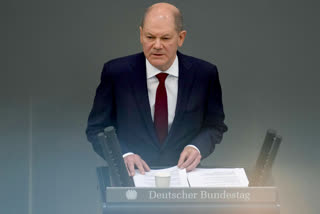Brussels: Germany announced Sunday it was committing 100 billion euros ($113 billion) to a special armed forces fund and would keep its defense spending above 2% of GDP from now on. It was one of the most significant shifts in European security policy in decades, brought on by Russia's invasion of Ukraine.
The announcement by German Chancellor Olaf Scholz, which came hours after Germany announced it would send weapons and other supplies directly to Ukraine, underscored how Russia's war in Ukraine was rewriting Europe's post-World War II security policy. It came as Israel offered itself as a potential mediator to help broker an end to the fighting, given it enjoys good relations with both Russia and Ukraine, and as protesters took to the streets in European capitals to demand an end to the war, the largest ground offensive on the continent since WWII.
Of the tens of thousands of people who massed in front of Berlin's Brandenburg Gate to protest the invasion, some carried posters with slogans such as "Hands off Ukraine," "Tanks to Windmills" and "Putin, go to therapy and leave Ukraine and the world in peace."
At the Vatican, Ukrainian flags fluttered in St. Peter's Square as Pope Francis delivered his weekly Sunday blessing.
Scholtz's announcement of new defense funding is significant for Germany, which has come under criticism from the United States and other NATO allies for not investing adequately in its defense budget. NATO member states committed to spending 2% of their GDP on defense, but Germany has consistently spent much less. "It's clear we need to invest significantly more in the security of our country, in order to protect our freedom and our democracy," Scholz told a special session of the Bundestag in Berlin.
Scholz said the 100 billion euro fund was currently a one-time measure for 2022. It wasn't immediately clear whether similar funding would be allocated in future years. But Scholz indicated Germany will exceed the 2% of GDP threshold going forward, signaling an overall future increase in defense spending. The German policy shift came as Italy, Austria and Belgium joined other European countries in closing their airspace to Russian aircraft, and Israel announced it was sending 100 tons of humanitarian aid — medical equipment and medicine, tents, sleeping bags and blankets — to help civilians caught up in the fighting in Ukraine.
Israel also offered itself as a potential mediator during a phone call between Israeli Prime Minister Naftali Bennett and Russian President Vladimir Putin, the Kremlin and Israel said. A senior Israeli official, who spoke on condition of anonymity because of the confidential diplomatic matter, said Bennett told Putin that Israel was ready to assist as much as required, and at any time, in order to help resolve the crisis and bringing the parties closer. On the European front, European Union interior and foreign ministers were holding emergency talks Sunday to respond to the crisis.
Interior ministers were debating how to cope with an influx of refugees from Ukraine, as well as managing security challenges on EU borders with Ukraine and humanitarian aid to the country. The U.N. refugee agency said as of Sunday more than 365,000 people had fled the country and estimated that 4 million could flee if the fighting spreads.
Later Sunday, EU foreign ministers were meeting via videoconference to discuss sending more military aid to Ukraine.
EU foreign policy chief Josep Borrell said he will urge the ministers to endorse "a package of emergency assistance for the Ukrainian armed forces, to support them in their heroic fight."
